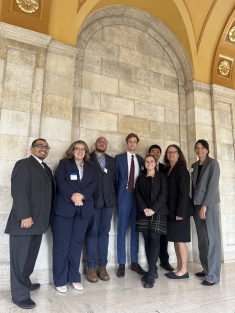Rutgers Law Housing Advocates Tackle Rent Affordability Before NJ Legislature

The New Jersey rental market just isn’t what it used to be. Housing prices have surged across the state in recent years, straining tenants’ budgets and limiting their options. Existing rental units are deteriorating in quality, forcing residents to live in poor conditions or spend their own money on repairs. Adding to this issue is the fact that most tenants face significant barriers to obtaining the legal representation they need to defend their rights or remain in their homes.
In response to this crisis, members of the New Jersey Housing Justice Project traveled to Trenton on September 23 to testify before the New Jersey Assembly Housing Committee.
“In addition to legal input and analysis, the testimony of the project partners gave a human face to the affordable housing crisis by focusing on the experiences of tenants and the systemic problems that cause eviction and displacement, often drowned out by technical conversations about costs and development,” says Victor Monterrosa, Jr., managing director of the Housing Justice and Tenant Solidarity Clinic at Rutgers Law School in Newark. “The presence of student attorneys, recent graduates, and directors showcased the fruits of our labor: the next generation of housing justice lawyers.”
The New Jersey Housing Justice Project, launched in 2021 and funded by the New Jersey Legislature, is a collaboration between Seton Hall and Rutgers Law Schools designed to expand housing advocacy for low- and moderate-income tenants in the state, while providing experiential learning opportunities to law students and new lawyers. Through this project, about 20 faculty and staff attorneys teach clinics, lead pro bono projects, coordinate housing justice programs, and supervise more than 100 law students working on a variety of housing-related legal issues.
Throughout their testimony, representatives from the New Jersey Housing Justice Project outlined three key focus areas for the Legislature: increasing rents, deteriorating rental units, and tenant access to attorneys.
Through her work with the Housing Advocacy Clinic in Camden, third-year Rutgers Law student Jenna Centofanti ’25 has seen landlords raise rents by as much as 25, 50, and even over 100 percent in a single year in New Jersey, where roughly 80 percent of municipalities offer no form of rent control. “A family shouldn’t be blindsided at the end of their lease with a rent increase so high they can’t afford to renew,” she said in her testimony.
“Likewise, a student renting month-to-month while supporting themselves through school shouldn’t be shocked by a sudden rent hike. No one renting in New Jersey should experience a rent increase that leaves them scrambling for a new home.”
As rent prices rise, housing quality is plummeting, testified Elias Bull ’24, a former student of the Housing Justice and Tenant Solidarity Clinic at Rutgers Law School in Newark and a current legal fellow at Make the Road New Jersey.
Bull’s testimony was highlighted by a specific case in East Orange, where a building was literally falling apart around its residents and the landlord had been cited with hundreds of housing code violations. “The tenants were on the verge of being pushed out by the horrible conditions or facing eviction if they withheld their rent to demand repairs,” he explained in his testimony. Instead, the tenants and their clinic attorneys succeeded in getting a court-appointed receiver—a person assigned to manage the building, collect rent, and use those payments to fund repairs.
“The fight is not over, but those tenants are still housed today,” Bull explained, emphasizing the importance of legal representation, legislative action, and proper oversight in ensuring fair housing.
In addition to amplifying the perspectives and experiences of their clients, Housing Justice Project participants who testified that day had a unique opportunity to collaborate closely with fellow law students, practitioners, and faculty and staff from other law school campuses and community-based organizations.
“It felt like the energy in the room changed the moment the Housing Justice Project came to the witness table,” says Ashley Maddison ’19, managing attorney of the Housing Justice Program at Rutgers Law School in Camden. “We shared real life examples of what the housing crisis looks like on the ground for New Jersey residents. We also showed our legislators what it looks like to become part of the solution: providing legal representation and advocacy, bringing together different organizations in support of a shared mission, and equipping future lawyers, community leaders, and tenants themselves with the tools to make the dream of safe, stable, affordable housing a reality for all New Jerseyans.”
Media Coverage: NJ Spotlight News